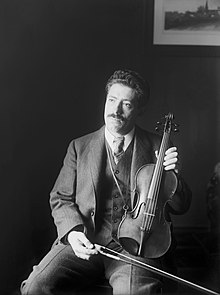| Revision as of 16:14, 18 December 2024 editJohn40332 (talk | contribs)131 editsNo edit summaryTag: Reverted← Previous edit | Latest revision as of 19:41, 5 January 2025 edit undoCurryTime7-24 (talk | contribs)Extended confirmed users21,275 editsm Reverted 1 edit by John40332 (talk) to last revision by CurryTime7-24Tags: Twinkle Undo | ||
| (9 intermediate revisions by 2 users not shown) | |||
| Line 15: | Line 15: | ||
| == Composition == | == Composition == | ||
| The piece is inspired from a performance of ] heard by the composer while they visited |
The piece is inspired from a performance of ] heard by the composer while they visited San Francisco.<ref>{{Cite web |last=顾馨 |title=Australian-Chinese violinist releases Tambourin Chinois at age 13 |url=https://global.chinadaily.com.cn/a/202102/26/WS60384e84a31024ad0baab368.html |access-date=2023-08-24 |website=global.chinadaily.com.cn}}</ref> As such, the piece is highly inspired by the ], though Kreisler said that he did not take any thematic information from his visit.<ref>{{Cite web |last=Marston |first=Ward |title=Fritz Kreisler, The Complete Recordings |url=https://www.chandos.net/chanimages/Booklets/NH2053.pdf}}</ref> | ||
| == Instrumentation == | |||
| According to Edition Zeza, the version for Violin and Orchestra is scored for the following instruments: | |||
| 2 ]s, ], ], 2 ]s, ], 3 ]s, ], ], ], Solo Violin, ]s (1st and 2nd), ]s, ]s, ]es. <ref name=EditionZeza> Score & Orchestral parts</ref> | |||
| == References == | == References == | ||
Latest revision as of 19:41, 5 January 2025
| Tambourin Chinois | |
|---|---|
| by Fritz Kreisler | |
 Picture of composer Picture of composer | |
| Key | B-flat major |
| Opus | 3 |
| Year | 1910 |
| Duration | 4 minutes |
| Scoring | Violin and Piano |

Problems playing this file? See media help.
Tambourin Chinois, Op. 3, known in English as Chinese Tambourine or Chinese Drum, is a piece by composer Fritz Kreisler for Violin and Piano. It is one of his most well-known pieces behind his Old Viennese Melodies and Praeludium and Allegro.
Composition
The piece is inspired from a performance of traditional Chinese music heard by the composer while they visited San Francisco. As such, the piece is highly inspired by the pentatonic scale, though Kreisler said that he did not take any thematic information from his visit.
References
- "Essential Historical Recordings: When Fritz Kreisler Changed How We Hear and Play Violin". Strings Magazine. 2022-12-13. Retrieved 2023-08-24.
- 顾馨. "Australian-Chinese violinist releases Tambourin Chinois at age 13". global.chinadaily.com.cn. Retrieved 2023-08-24.
- Marston, Ward. "Fritz Kreisler, The Complete Recordings" (PDF).
| Fritz Kreisler | |
|---|---|
This article about a classical composition is a stub. You can help Misplaced Pages by expanding it. |